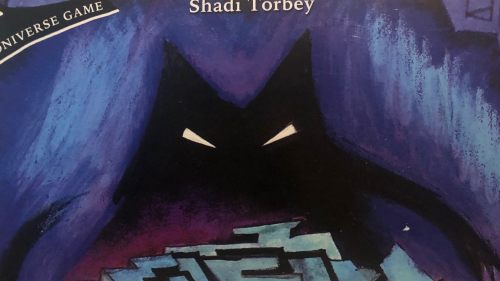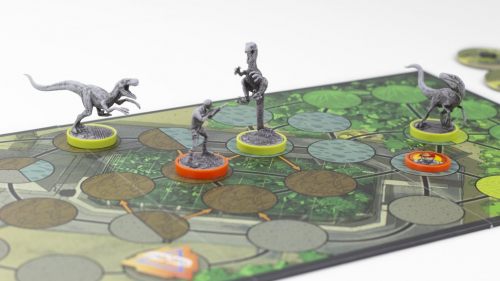Board Game Review: SCYTHE
Scythe is a giant game. Physically the board is huge (flip it over to reveal half the map at twice the size - indicating you can purchase the other half and make the game even bigger). You will fill that board with four mechs, one main character, up to eight workers, four buildings and a bunch of little wooden resources per player. On top of that, you have an intimidating number of different cards to mess with.
But Scythe is also huge in terms of reputation. It’s one of those games you just see everywhere once you start learning about games. Board Game Geek has it ranked at number ten right now, and it’s been up around there for a while. The box is big, adorned with beautiful artwork that just screams its own seriousness at you. But Scythe is also a bit uninviting. Like other big, high profile games (I’m thinking of Gloomhaven or Dune or Gaia Project), it is intimidating and expensive and you just know you’ll need to have it down cold before you can even think about bringing friends into the mix to actually play it.
And you’re not wrong. The best way to teach a game is to play it, but with Scythe you’re still going to need a monologue or two before everyone starts taking turns. Once you do, it still might be a while - even a whole game - before it all clicks into place for you and your friends. Eventually, however, it’ll happen and Scythe will reveal itself as approachable, understandable, and maybe just a little overrated.
I can only speak for myself, but part of learning Scythe is unlearning what kind of game you think Scythe offers. Its setting, gorgeous aesthetic and highly detailed mechs and characters give the impression this will be a game about war. It’s not. You can have little fights, but your cool looking mechs and badass character (or their ferocious animal) have little to do with a fight’s outcome, which is dictated by how many numbers you are willing to lose more than anything your giant robot can do.
It’s a little disappointing, but fine. If Scythe isn’t about war, what is it? Well, your focus is going to shift throughout the game but overall Scythe is a game of economics. You win by adding up money at the end. You get that money by controlling land hexes, having resources and succeeding wildly at up to six out of ten things. The value of your scores gets dictated by how popular you are by game's end. You can have everything but it’s not worth as much if everyone thinks you’re a dick.
“Six Out of Ten Things” - that’s what they should have called this game instead of Scythe. At the top of the board, you find ten slots for different tasks. Do six of them and you automatically end - not win but just end - the game. You can produce all your mechs, get the highest level of popularity, put all your workers on the field…etc. Basically, anything you max out gives you one of your six stars. One star goes toward fulfilling a task given to you before the game begins. Two of the stars go toward winning fights.

This star system gives you direction, something the game simply wouldn’t otherwise have. Those tasks in particular force you to branch out onto the board and get closer to fellow players. Fighting is also a good incentive to get out there, as are Encounter spaces that tell bits of story and give bonuses. There’s also the Factory, smack in the center of the map, which offers you great benefits if you get your character out there.
Or you can ignore it. You can ignore your task too. And try to ignore any fighting if you want. Scythe’s six-out-of-ten system means you can dismiss any four methods of collecting stars in favor of the six that remain. It is entirely possible for a group to play this game and never once interact on the map, just doing their own thing, farming wood until you’ve maxed out all the buildings they create and then moving on to metal to max out your mechs and so on. You are somewhat in charge of how boring your game of Scythe turns out.
Scythe isn’t really an engine building game, but it does have a ramping up process. You begin locked into a few hexes. Movement is painfully slow at first. Your production will be pathetic for a while. Eventually, however, you get rolling along and start doing some major things in terms of movement and putting resources on the board. But don’t get too comfortable! At some point you may realize someone is about to end the game with their sixth star and it might not be you. Time to start letting go of the whole “stars” thing and prepare yourself for your endgame placement. In other words, Scythe has a very interesting three-act structure to it. You start out worthless and unable to do much, then you become an active powerhouse for a bit, and then you get ready for the sweet embrace of death or go out in a gung-ho blaze of glory.

Aside from the art direction, Scythe’s only real personality comes from Encounter Cards and the special powers granted to its five factions, each close but not quite representing an Eastern Europe region. It’s pretty important which faction you get at the beginning of the game. I tend to pass them out randomly since I’m mostly playing with first-timers who don’t know one from the other. But as you play more often, people get pickier about their faction, which I take as a sign of quality. Each has their own little super powers that can dramatically affect how you play.
You’ll notice two starting points on your board that don’t have factions. Time for an expansion! Scythe has a lot of them, the most pressing is obviously “Invaders from Afar” which adds the two missing factions, allowing you to play up to seven players. With seven folks, it’s probably not so easy to avoid fights. I also imagine one of those games taking a long-ass time to play. As such, I probably won’t be getting this expansion any time soon. Another expansion adds airships. A third adds a campaign. That one has my interest, but I’m also more likely to focus my attention on other games at this point.
On the other hand, Scythe has proven very popular among my friends. The more they understand the game and improve, the more they want to play it, indicating that the time investment ultimately pays off, creating an experience people want to come back to rather than run away from screaming. I usually have to bully my friends into playing these things. Having one they specifically ask to play is a big deal, and if it continues into a regular thing, I will definitely end up with at least one of these expansions.
Which is my way of saying, Scythe is special. Even if I don’t love the game, it has some hooks to it. I wish it were faster, I wish the combat were more interesting, I wish there were a stronger connection between its aesthetics and mechanics, and I think it’s far from the tenth-best board game of all time. But this is going to be a game that I take out more often than my others, even if I do so begrudgingly. In the end, that might be the only factor that matters.



